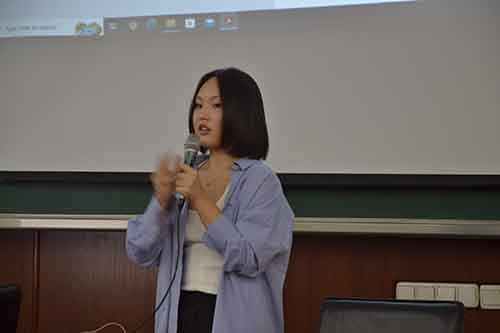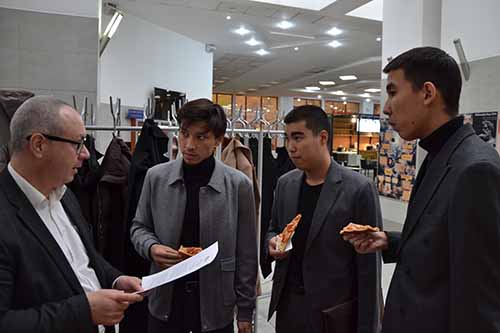Challenge conventional thinking and embrace intellectual freedom was the guiding message at KIMEP University hosted Philosophy Day on Nov. 8
“It’s rare to stop and think in today’s fast-paced world,” said Dr. Santiago De Lasala, a philosophy professor. “This event gave us time to pause and reflect on the deeper questions of life.”
The event, themed “Relevance of Philosophical Ideas for Youth in Kazakhstan: Human Prosperity and the Well-being of the Individual and the World”, brought together around 40 participants, including students and faculty, to explore the enduring significance of philosophy in today’s tech-driven era. Highlights included five student presentations, two lively debates culminating in a final, and a creative poster competition that translated complex philosophical ideas into accessible visuals.

Dr. Damian Riviez, Vice President of Academic Affairs, Dr. Joseph Luke, Interim Dean of Student Affairs, and Dr. Federico Dalpane, Assistant Professor at CHSE, delivered inspiring opening speeches. A distinguished jury, comprising Dr. Nicolás Zambrana-Tévar (School of Law, KIMEP U.), Dr. Santiago De Lasala Porta (CHSE, KIMEP U.), Dr. Didar Kassymova (CHSE, KIMEP U.), Dr. Federico Dalpane (CHSE, KIMEP U.), and Dr. Marat Zagidullin (University of Reading Malaysia), evaluated the presentations and creative efforts, underscoring the high academic standards of the event.
“Philosophy isn’t outdated,” said Dr. Federico Dalpane, one of the event organizers. “It’s a companion to innovation, ensuring we ask not just ‘How?’ but ‘Why?’ It delivers intellectual freedom and reminds us not to remain stuck in one mindset.”
One contribution came from Alima Zeinulla and her co-creator Samat Adilov, both second-year students. Their poster, What is Happiness? invited viewers to consider how happiness has been defined across centuries.
“This topic is timeless,” Zeinulla said. “Happiness isn’t one-size-fits-all; it’s something each person must define for themselves.”
For Adilov, the poster was a call to action.
“We wanted to inspire people to think deeply about their own lives,” he said.
The debates fired up the audience with sharp exchanges.
Aida Alibek, a second-year student, argued that AI kills creativity, referencing a Stanford study that demonstrated a decline in critical thinking among students using AI tools.
“Debates like this force you to see multiple sides of an issue,” she said. “It sharpens your understanding and challenges your perspective.”
“These debates are not just about proving your point; they develop the ability to see the world through multiple perspectives, making students more agile, empathetic thinkers,” said De Lasala.
Student presentations delved into themes that felt both timely and timeless. Second-year student Dameli Assanbayeva talked about creating a utopian society. She connected Plato’s ideals with Francis Fukuyama modern examples, like Bhutan and Scandinavian countries.
“Though perfection may be unattainable, the process of striving for it teaches us valuable lessons for future generations,” she said.
xxx
Aluna Imanzhanova asked, “What is the most important goal in life?”
“In today’s fast-paced world, we rarely stop to ask, ‘Is this what I truly want?’ Existentialist philosophy teaches us to listen to ourselves and take control of our paths.”
For Dalpane, the day epitomised the enduring relevance of philosophy.
“Technology often gives us the illusion that it will solve all our problems, but philosophy is what helps us make sense of those solutions,” he said. “It’s not in competition with technology but complements it by helping us understand its implications.”
De Lasala echoed this sentiment.
“Our society moves so fast that we often forget to think critically,” he said. “Philosophy forces us to stop, to question, and to deeply understand what truly matters—whether it’s happiness, ethics, or technology. That’s the beauty of events like this. They remind us to value thoughtfulness.”
Both professors agreed that philosophy shapes not just individual minds but society at large.
“It’s about building habits of curiosity and mental flexibility,” said Dalpane. “Philosophy doesn’t just stay in the classroom—it’s everywhere, influencing how we navigate life.”
First-year volunteer Nargiz Galymzhanova said she found the experience enlightening.
“It was fascinating to see professors and students interact so closely,” she said. “The topics were engaging and made philosophy feel accessible.”
Her fellow volunteer, a first-year student Aida Amanzhol, agreed.
“It’s amazing how philosophy, which can seem abstract, was presented in such a relatable way,” she said. “ I’m excited to see more events like this in the future.”
First-year student Yersultan Toktamyssov described it as an eye-opener.
“I stumbled upon the event and was amazed by the quality of the work. It’s clear that KIMEP takes philosophy seriously,” he said.
Third-year student Imanzhanova expressed hope that this would mark the beginning of a tradition.
“Moments like this help us stop and think—about ourselves, our lives, and whether we’re truly pursuing what we want,” she said.

